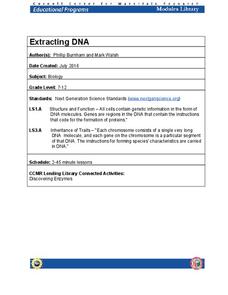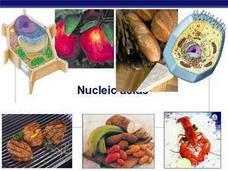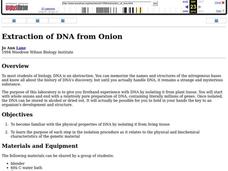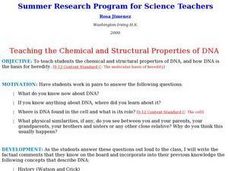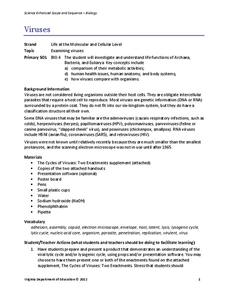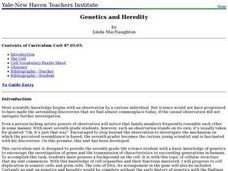Curated OER
Nucleic Acids
A lively presentation presents general facts and history of nucleic acids in a note-taking format. Every slide contains colorful photos or graphics to illuminate and engage. Biology aces learn about the function and structure of...
Curated OER
Teaching Biology Through Bioinformatics
Wow! A very detailed slideshow covers complex topics of genome research methods. This is advanced and relevant to the highest level of school biology. Excellent resource if you wish to expose your class to scientific methods and...
Cornell University
Extracting DNA
Uncover the basics of DNA structure through exploration activities. Collaborative groups build DNA models and recreate the process of replication. Then, using plant cells such as peas or strawberries, they extract a DNA sample.
Biology Junction
Viruses, Viroids, and Prions
Are viruses living or non-living? According to the presentation, they are both and neither. Clearly, this requires clarification and an in-depth look at viruses, viroids, and prions. Young scientists learn about the history, structure,...
Curated OER
The Brain’s Inner Workings
Do you want to learn about how you learn? Help pupils become the best learners they can be by teaching them how their brain works. The resources available include videos about brain structure and a study guide full of activities that...
Curated OER
Nucleic Acids: information storage
This sequence of slides covers each main macromolecule that is involved with human structure and function. The history of nucleotide research and the way that they are formed is summarized, a diagram accompanies the explanation. The main...
Curated OER
Mathematics in Bioengineering: Its Application for Today's Students
High schoolers explore the different fields of bioengineering. They will create and interpret graphs from cancel cells data. They then calculate the amount of drugs found in blood and eliminated by the body over time.
Wyatt Bingham
Comparative Essay: Tips for Timed Writing
This site provides a guideline for writing a comparative essay for the AP World History Test. It also provides practice exercises and samples.
Curated OER
Extraction of DNA from Onion
Young scholars experiment with DNA by isolating it from plant tissue. They investigate whole onions to prepare DNA. They complete the experiment to examine the structural characteristics of DNA.
Curated OER
DNA
Students explore the basics of DNA and its history. In this DNA lesson students extract DNA from fruits and understand how it is used in forensics.
Curated OER
Teaching the Chemical and Structural Properties of DNA
Students work together to answer questions about DNA. They identify where DNA is found and its function in the cell. They note any physical similarities they have with their family members
Curated OER
The History of Life
In this history of life learning exercise, high schoolers review 4 vocabulary words associated with the beginnings of life. Students place these terms into a crossword puzzle and then complete 2 fill in the blank questions.
Curated OER
Organelles
Pupils explore the functions of major eukaryotic organelles. They compare and contrast prokaryotic and eukaryotic cells. Given diagrams and drawings, students take turns drawing structures, discussing their function, and labeling each...
Curated OER
Egg Carton Coral
Students use egg cartons to construct models of coral colonies showing
many aspects of the coral's natural history - including the structure of
coral polyps and the coral colony's colonial life style.
Virginia Department of Education
Viruses
Germs, parasites, and viruses, oh my! Facilitate a lesson on viruses as individuals explore functions of Archaea, Bacteria, and Eukarya. They learn how viruses compare with other organisms in nature and how they contribute to health...
Curated OER
Biology: Genetics and Heredity
Seventh graders explore the connection between genetics and heredity by examining the cellular structure. Among the numerous activities to engage students are drawing DNA molecules, vocabulary puzzle sheets, and predicting possible...
Curated OER
Embryology as Evidence of Evolution
Students observe the two major developmental pathways (protostome and deuterostome). They analyze data regarding differences in nucleotide sequences and construct a phylogenetic tree. They observe the similar evolutionary history shared...
Curated OER
Chromosome Karyotyping
High schoolers explore chromosome karyotyping. In this chromosome karyotyping lesson plan, students use a chromosome kit to explore chromosome syndromes and disorders. They also produce a large model of a cell with chromosome to simulate...
Curated OER
Investigating DNA
High schoolers engage in a variety of activities designed to facilitate the understanding of DNA. Activities include preparing human chromosome spreads, separating a mixture of dyes using gel electrophoresis and extracting DNA from onion...
Curated OER
Sizing Up the Supersize Croc
Students examine and compare traits of humans and crocodiles. In this crocodile lesson plan students use a ratio to estimate the height of a person and compare that to a crocodile.
Curated OER
Diversity of Life: Pathogens
Students research bacteria and viruses that carry pathogens. In this diversity lesson, students examine how pathogens spread disease through bacteria and viruses. Students write a report on disease caused by bacteria or virus including...
Curated OER
DNA: The Search for the Genetic Material
Learners study the history of DNA and how to extract it. In this genetic lesson students complete a DNA experiment using bacteria.
Curated OER
Change Through Time
In this evolution worksheet, high schoolers will complete a table by writing in the era and biological event based on 4 different time periods of Earth's history. Students will answer 8 fill in the blank questions based on the different...
Curated OER
Extensions - Biology Review Unit
Students engage in a variety of activities in order to review a Biology unit. For example, they research the Bird Flu, it's history, how it is spread, what has been done about it, what better options exist for controlling or removing it....


